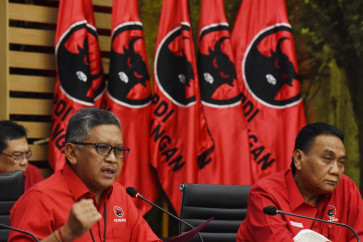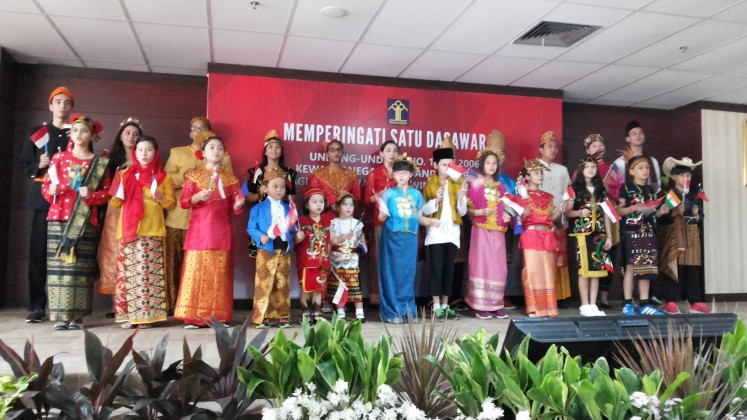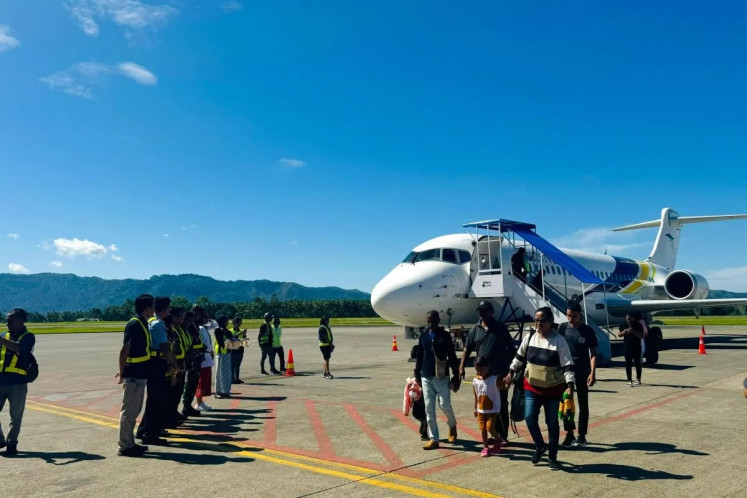Local communities strive for healthier neighborhoods
They come from different backgrounds and local cultures, but they share the same goal: Creating a better place to live
Change Size

T
hey come from different backgrounds and local cultures, but they share the same goal: Creating a better place to live.
Residents of a hamlet in Sukabumi, a tea plantation area in West Java, were overwhelmed with outbreaks of malaria, diarrhea and skin diseases.
In 2004, eight residents died of malaria and an entire neighborhood unit tested positive for the disease. The only way out offered by local community health center officials was for a change of lifestyle by the Cijangkar residents.
"The main problem is open defecation. Most residents didn't have access to clean water, let alone a proper toilet," Emus Muhsin, a representative of the group, told a discussion Monday at the Public Works Ministry.
Currently, residents are building a piped water system and sanitation, all managed by themselves.
"We no longer have to carry water as far as 300 meters to our homes or spend Rp 2,000 a day buying it. Now, with a Rp 10,000 *less than US$1* monthly fee, residents can use as much as clean water as they need," Emus said.
Fishermen in the port town of Belawan, North Sumatra, used to have their own "floating toilet", said their representative, Chaidir Panjaitan. Residents defecated in plastic shopping bags, which they then threw out to sea.
"The local government built us a public toilet early this year, which we can use to bathe and wash in, and which we maintain and manage ourselves," he said.
"Now that residents are using the public toilet, we rarely find *floating toilets' on the shore."
For residents of Argosari village on the foot of Mount Semeru, Malang regency in East Java, the extensive use of firewood to cook and abundant waste from buffalo pens have long been a problem.
Illegal logging in the nearby state forestry area and the Bromo Tengger Semeru National Park have led to deforestation, pollution and sanitation-related diseases for the villagers, not including the hazardous smoke from wood-burning fires.
In the past few years, villagers have developed an integrated forest and waste management program.
They use only bamboo as cooking fuel, and turn dung into biogas to power electricity generators. The government and USAID's Environmental Services Program support the initiative and provide technical assistance.
"Money is the problem in developing more of the system. The villagers are now chipping in to build one in each neighborhood," said resident Muhammad Irwan Nurul Zain.
The village now has four units of the system and has become a model for other villages in the vicinity, and even further afield.
In Yogyakarta, community group Lestari has helped the government solve the city's garbage problem. Home to more than 500,000 people, the city produces 350 tons of garbage each day, mostly household waste. Most of the garbage was disposed of in three rivers in the city: the Code, which runs through Yogyakarta, the Gajah Wong to the east, and the Winongo to the west.
The administration also sent garbage to the landfill managed by the neighboring Sleman regency administration, paying an annual tipping fee of Rp 1.8 billion.
"We disseminate information to residents on how to reduce, recycle and reuse household garbage. They now separate organic waste and turn it for compost, while making profit from non-organic garbage that they make into bags, belts, wallets and vests," said Lestari coordinator Agus Hartana.
Although the two-year effort has yet to significantly reduce garbage output, Agus said residents had slowly but surely changed their mind-set about garbage.
"We're creating an economy scheme all residents can benefit from it," he said.
The four communities were invited to present their achievements at a discussion on community-based sanitation development, as part of a two-day convention and exhibition on urban sanitation strategies.
Although they have now realized that communities can play a strategic role in creating a healthier neighborhood, they urged the government to tap more into the sanitation problem.
"There are six slum areas in Belawan that really need proper toilets and access to clean water. We hope the government looks into this matter," Chaidir said.
Agus said the government should issue a policy on waste management to oblige producers to find ways to reduce consumer waste.









